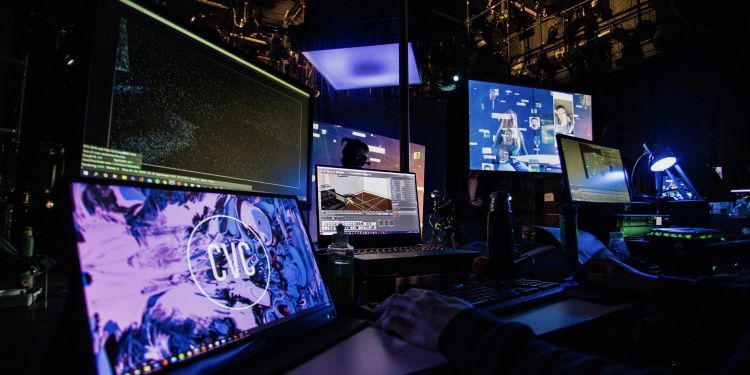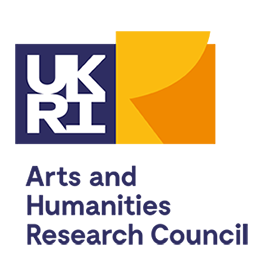
Breadcrumb navigation
ADAPT-AI Doctoral Focal Awards
ADAPT-AI: Analysing and Diversifying Audience Participation with Creative Technologies & AI is a new doctoral studentship scheme. We are seeking passionate researchers and practitioners from diverse backgrounds to join our innovative doctoral training programme exploring how audiences experience and engage with creative technologies and artificial intelligence.

What is ADAPT-AI?
ADAPT-AI: Analysing and Diversifying Audience Participation with Creative Technologies & AI is one of just ten new AHRC-funded Doctoral Focal Awards in the UK. Combining research expertise in the creative industries, digital humanities, media production, and performance practice, we're training the next generation of leaders who will shape how audiences interact with immersive experiences - from VR and AR to AI-powered creative content.
Working with world-leading cultural venues and industry partners including Serpentine Arts Technologies, Southbank Centre, Barbican Immersive, Target3D, and more, you'll develop cutting-edge research skills alongside practical expertise in machine learning, extended reality, ethical audience analysis, and inclusive participation methods.
We value many paths to doctoral research. Whether you come from academic study, professional practice in creative industries, or have taken a non-traditional route to research - your unique perspective and experience are what we're looking for.
The ADAPT-AI scheme is run by a consortium of three distinctive London institutions, Guildhall School of Music & Drama, King's College London, and London South Bank University. If you are awarded a funded place through the consortium, you will have access to cutting-edge facilities, millions of audience members annually through our partners, and a supportive community of researchers working at the intersection of creativity and technology.

Funded by
The Arts and Humanities Research Council Doctoral Focal Awards champion the next generation of researchers, offering future-facing training in areas vital to the UK’s creative economy and societal wellbeing. The ADAPT-AI programme has been awarded funding to train 33 students across four cohorts over seven years
Our Three Research Themes
The ADAPT-AI scheme supports projects that fall under the following three themes. Whilst all projects will be supported across institutions, each theme also has a 'home' institution. Applicants should therefore direct their applications according to the below.
Institution: Guildhall School of Music & Drama
The Audience Interaction theme focuses on novel participatory methods and co-creative practices enabled by creative technologies and AI in live, embodied, and performative contexts. This theme investigates how audiences move from passive engagement to active participation, examining the choreography of interaction between performers, events, artworks, audiences, and intelligent systems. Research might explore real-time responsive experiences, interactive performance, audience agency in immersive environments, and the blurring boundaries between creator and spectator.
Projects may investigate (but are not limited to) motion capture for audience-responsive performance, AI-driven adaptive narratives, participatory design methodologies, accessible interaction paradigms for neurodiverse audiences, embodied interaction in music, dance and theatre, or the ethics and aesthetics of audience behavioural influence.
Research might also extend beyond the performance moment, considering how interaction may begin before and continue after the event through digital interfaces and evolving datasets, reframing the one-off cultural encounter as as a continuing ecology of exchange between human and machine memory. The theme draws upon practice-based research methodologies from performing arts, choreography, live art, and interactive media, emphasising embodied knowledge and human-centred approaches to understanding participation. Research questions how interaction design can create meaningful cultural experiences while respecting audience autonomy and addressing power dynamics in participatory practice.
An information session was held on 19th January. For access to the recording and slides please email adapt-dfa@kcl.ac.uk.
Institution: King's College London
The Audience Interfaces theme focuses on how creative technologies, including AI and XR, mediate the relationship between audiences, cultural content, and institutional spaces. This theme explores the systems, platforms, and socio-technical frameworks which audiences encounter and engage with arts and cultural experiences in both physical and digital realms.
Research under this theme investigates how technological interfaces shape audience attention and perception, enable the quantitative assessment of participation and engagement, facilitate access, and create new modes of cultural participation. Projects may explore (but are not limited to) attention and perception modelling in cultural contexts (including physiological and biometric engagement tracking but also wider studies of how culture is being experienced), data-driven audience analysis, responsive digital platforms, spatial computing in cultural venues, interface frictions with differently-abled bodies and novel interface design for diverse audience needs.
The theme draws upon critical frameworks from media studies, platform studies, digital humanities, HCI/UX and user-centred design, critical disability studies and cultural analytics, developing theoretical and methodological approaches to understanding technology-mediated cultural experiences. Research is underpinned by ethical considerations around data collection, privacy, algorithmic bias, and the responsibility of cultural institutions and venues in shaping technology-enabled audience experiences.
Please note applicants responding to these theme should apply to KCL.
Institution: London Southbank University
The Audience Integration theme addresses how diverse communities can be meaningfully brought into cultural experiences through creative technologies, while exploring sustainable production workflows, curatorial and organisational models, and distribution strategies for immersive and AI-enhanced cultural content.
This theme examines barriers to cultural participation – social, economic, geographical, and technological – and investigates how advanced technologies including AI and ML, XR (VR/AR/MR), and game engines can bridge or sometimes inadvertently reinforce these divides. Projects may investigate (but are not limited to) AI or XR production for accessibility, community-centred co-production methodologies, game engine workflows for cultural content, technical production pipelines, AI literacy, public engagement models, measurement of social impact beyond attendance figures, policy frameworks for digital and cultural infrastructure, alternative legal or economic frameworks for project distribution, and hybrid physical-digital models for expanding cultural reach.
The theme emphasises the development of creative-technical production skills in service of equity and social justice, and sustainable approaches to cultural technology that serve public good rather than commercial interests alone.
Applicants responding to this theme should apply to London Southbank University.
Who should apply?
We welcome applications from people with:
- Academic qualifications in relevant fields (e.g. arts, humanities, creative practice, social sciences) OR significant professional experience in creative industries, technology, audience development, or related sectors
- A passion for understanding and diversifying audiences
- Interest in ethical and responsible use of creative technologies
- Commitment to inclusive research practices
We recognise that excellence comes in many forms. If you have deep professional expertise, creative practice experience, or have overcome barriers to reach this point - we want to hear from you.
How to apply
In order to be considered for an ADAPT-AI studentship, you will need to make two applications:
1. An application to study at Guildhall School.
Please contact pgr.admissions@gsmd.ac.uk and follow the standard process outlined on our how to apply page. If you are applying for one of the industry defined challenges, please mention this when sending us your draft proposal.
Please note the closing date for applications is Monday 2 February 2026.
2. A separate funding application through the ADAPT-AI website.
Details of the process can be found on the ADAPT-AI website. Please note the closing date is Monday 13 February 2026.
Information session
To find out more about ADAPT-AI, join the online information session.
Monday 8 December 2025
1-2.30pm
To register: email adapt-dfa@kcl.ac.uk
Three Ways to Apply
There are three ways of applying for ADAPT-AI funding. Please see below for details. Please note that not all routes are available through every institution every year.
A collaborative doctoral award allows you to co-design your research with industry partners on pre-defined projects addressing real-world challenges. For 2026 the following CDA is open for applications:
Beyond Engagement with Serpentine Arts Technologies
Please note, this CDA is run through King's College London.
By applying through the Industry Defined Challenges route you will design a project that responds to specific questions posed by creative industry partners. Guildhall School is inviting applications that respond to the following challenge areas:
Partner Organisations: Target3D / VIVE Arts
This challenge area investigates how motion capture, computer vision, and AI can enable genuine co-creative dialogue between live performers, intelligent systems, and audiences in performance contexts. Moving beyond simple trigger-response interactions, how might AI systems interpret and respond meaningfully to both trained performers and audience participation, creating three-way conversations between human, machine, and spectator?
Research explores the aesthetics and ethics of AI as creative collaborator rather than tool, examining questions of agency, authorship, and the preservation of performer autonomy when working with responsive systems. How do performers and audiences experience and value AI-mediated interaction? What interaction paradigms enable meaningful participation while respecting different levels of ability, confidence, and desire to engage?
Research might also extend beyond the performance moment, considering how interaction may begin before and continue after the event through digital interfaces and evolving datasets, reframing the one-off cultural encounter as as a continuing ecology of exchange between human and machine memory. Drawing on practice-based research methodologies, embodied cognition theory, and performance studies, this work will develop through iterative creative residencies, generating both artistic outputs and theoretical frameworks for understanding human-machine collaboration in live performative contexts.
Partner Organisations: Target3D / VIVE Arts
This challenge area investigates how motion capture, computer vision, and AI can enable genuine co-creative dialogue between live performers, intelligent systems, and audiences in performance contexts. Moving beyond simple trigger-response interactions, how might AI systems interpret and respond meaningfully to both trained performers and audience participation, creating three-way conversations between human, machine, and spectator?
Research explores the aesthetics and ethics of AI as creative collaborator rather than tool, examining questions of agency, authorship, and the preservation of performer autonomy when working with responsive systems. How do performers and audiences experience and value AI-mediated interaction? What interaction paradigms enable meaningful participation while respecting different levels of ability, confidence, and desire to engage?
Research might also extend beyond the performance moment, considering how interaction may begin before and continue after the event through digital interfaces and evolving datasets, reframing the one-off cultural encounter as as a continuing ecology of exchange between human and machine memory. Drawing on practice-based research methodologies, embodied cognition theory, and performance studies, this work will develop through iterative creative residencies, generating both artistic outputs and theoretical frameworks for understanding human-machine collaboration in live performative contexts.
For other challenge areas running through King's College London and London Southbank University, please see the ADAPT-AI website.
If you would like to develop your own research idea aligned with ADAPT-AI's three core themes, please apply via this route. Guildhall School is inviting proposals that align with the Audience Interaction theme.
Funding Package
Successful applicants will be supported with the following:
- Tuition fees directly funded
- An annual stipend at the UKRI (London) rate (currently £22,780 full time)
- Research training and support
- Access to state-of-the-art facilities
- Opportunities to attend conferences and workshops
Funding will be awarded for 3.5 years (full time) or 7 years (part time).
Both UK and international applicants are eligible to apply (we are permitted by UKRI to award up to 30 percent of studentships to international applicants).
Our industry partners














